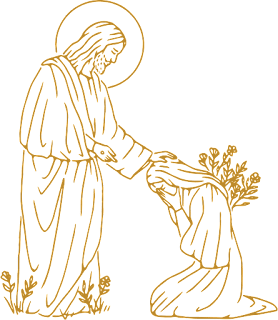Like many of the emotions and stirrings of the heart that we feel when we hear another's story of conversion and personal epiphanies, there is no difference from what others before may have experienced and expressed. What stirs us in the hearing is the glimpse into the heart of some one who in the telling verifies and reinforces what we have experienced in our own spiritual life. At work also is the mode of expression that presents facets of spiritual conversion that inspire the listener to ever greater conversion.
"Return, she says. Clearly he whom she calls back is not there, yet he has been, not long before…. So importunate a recall shows great love on the part of the one and great loveliness on the part of the other. Who are these who are so taken up with charity, these unwearying lovers, whose passion drives them on and gives them no rest?
… Who will disclose to me the mystery of this change? Who
will adequately explained to me the going and returning of the Word? Surely the
Bridegroom will not stoop to inconstancy?… How can any movement of any kind be
attributed to him who is God? For he is immutable.
2.… Let us then follow this discourse of pure love,[1]
and say that the word of God, God himself, the Bridegroom of the soul, comes to
the soul and leaves it again as he wishes,[2]
but we must realize that this happens as a result of soul's sensitivity, and is
not due to any movement of the Word. Indeed, when the soul is aware of the
influence of grace she acknowledges the presence of the Word; but when she is
not, she mourns his absence and again seeks his presence, saying with the
prophet, 'My face has sought you; your face, Lord, I will seek.'[3]
3.… Now show me a soul which the bridegroom, the Word, is
accustomed to visit often, whose friendship has made bold, for who hungers for
what it has once tasted, whom contempt of all things has given leisure, and
without hesitation I will assign it the voice and name of the Bride….
4. Now it is clear that his comings and goings are the fluctuations
in the soul of which he speaks when he says 'I go away, and come again to you',[4]
and, 'a little while and you shall not see me, and again a little while and you
shall see me.’[5]…
How long a little while! … The word of my Lord may not be doubted, but it is a
long while, far too long.… For the loving soul is carried away by her prayers
and drawn on by her longing; she forgets her deserts, closes her eyes to the
majesty of the Bridegroom but opens them to the pleasure he brings, looking
only at his saving grace,[6]
and in that putting her confidence.… Calling him, with accustomed familiarity,
not 'Lord' but 'beloved': 'Return, my beloved'.
6. You ask then how I knew he was present, when his ways can
in no way be traced?[11]
He is life and power,[12]and
as soon as he enters in, he awakens my slumbering soul; he stirs and sooths and
pierces my heart,[13]
for before it was hard as stone,[14]
and diseased. So he has begun to pluck out and destroy, to build up into plant,
to water dry places and illuminate dark ones;[15]
to open what was closed and to warm what was cold; to make the crooked straight
and the rough places smooth,[16]
so that my soul may bless the Lord, and all that is within me may praise his
holy name.[17]…
It was not by any movement of his that I recognized his coming; it was not by
any of my senses that I perceived he had penetrated to the depths of my being.
Only by the movement of my heart, as I have told you, that I perceive his
presence; and I knew the power of his might[18]
because my faults were put to flight and my human yearnings brought into
subjection. I have marveled at the depth of his wisdom[19]
when my secret faults[20]
have been revealed and made visible; and the very slightest amendment of my way
of life I have experienced his goodness and mercy; in the renewal and remaking
of the spirit of my mind,[21]
that is of my inmost being, I have perceived the excellence of his glorious
beauty,[22]
and when I contemplate all these things I am filled with awe and wonder at his
manifold greatness.[23]"
CISTERCIAN FATHERS SERIES: NUMBER FORTY - BERNARD OF
CLAIRVAUX – ON THE SONG OF SONGS IV
[1] Ps 12:7 [2] 1 Cor 12:11 [3] Ps 27:8 [4] Jn 14:28 [5] Jn 16:17 [6] Ps 12:6 [7] 2 Cor 1:11 [8] Ps 121:8 [9] 1 Cor 5:12
[10] Ps 52:11 [11] Rom 11:33 [12] Heb 4:12 [13] Sg 4:9 [14] Si 3:27, Ez 11:19, 36:26 [15] Jer 1:10 [16] Is 40:4
[17] Ps 103:1 [18] Eph 1:13 [19] Qo 7:25 [20] Ps 19:13 [21] Eph 4:23 [22] Ps 50:2 [23] Ps 151:2



